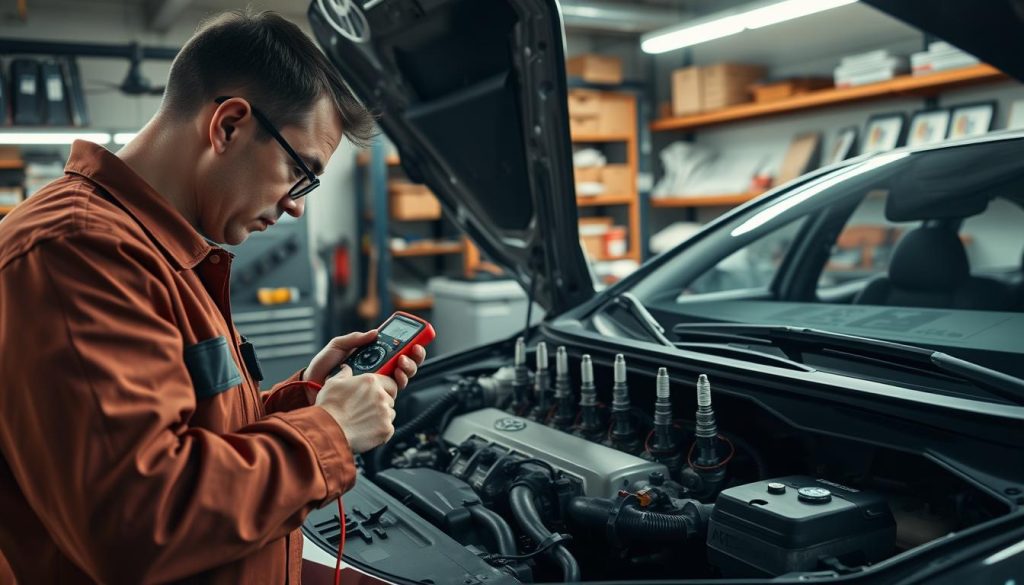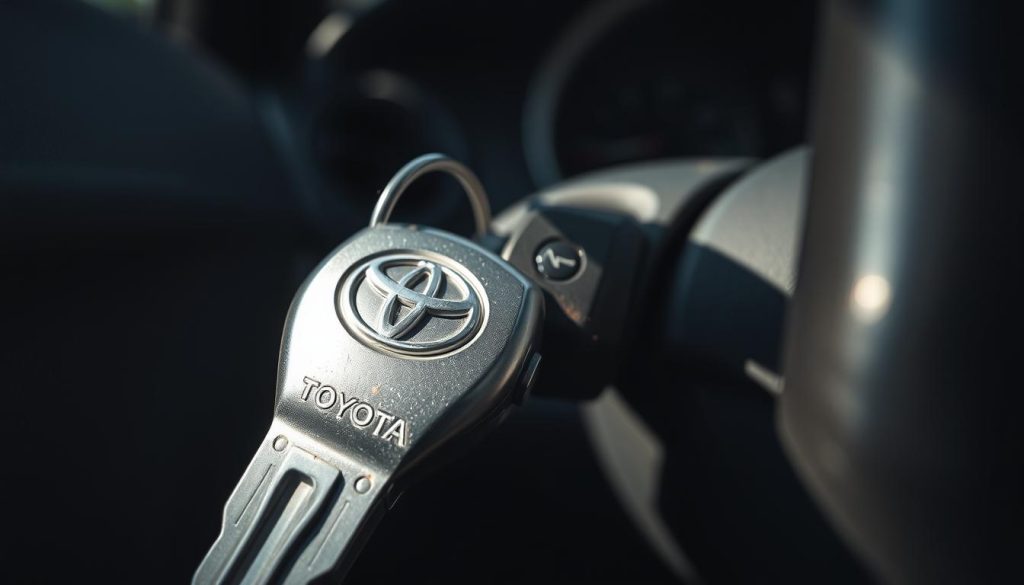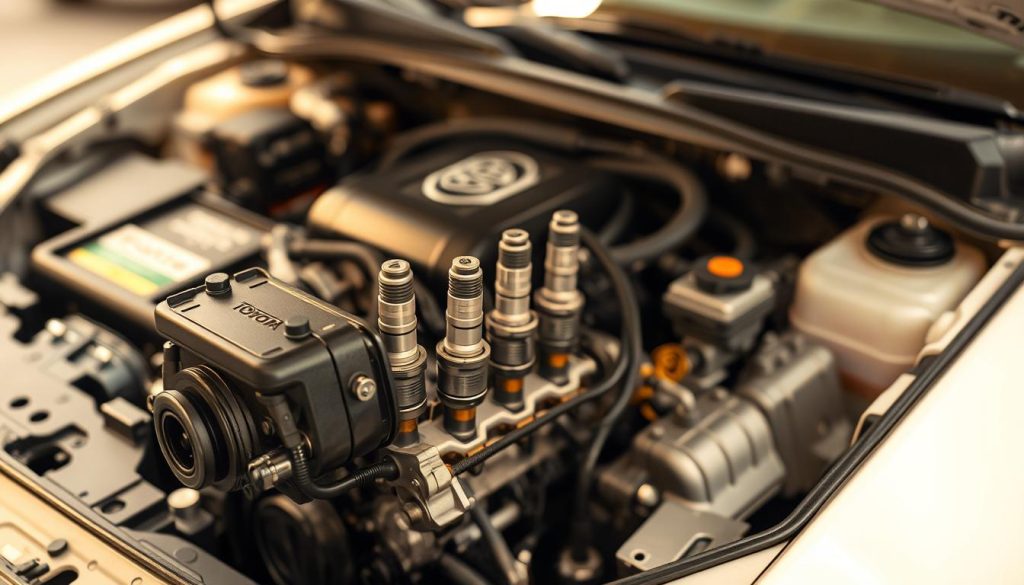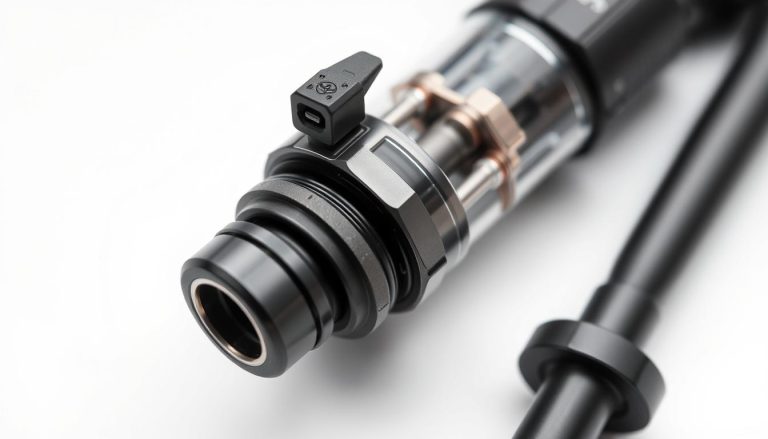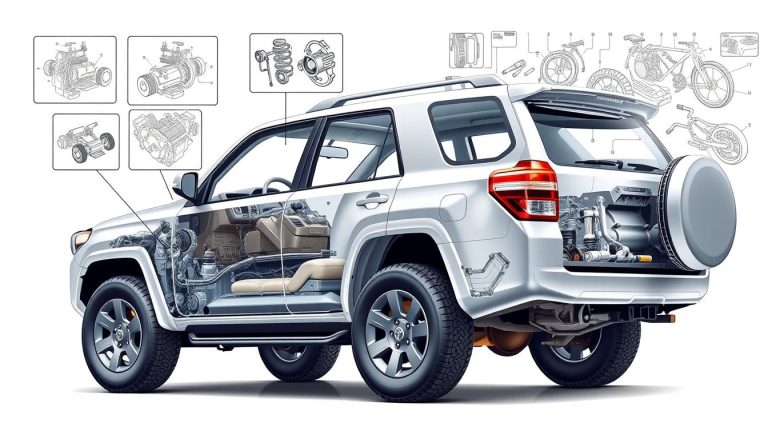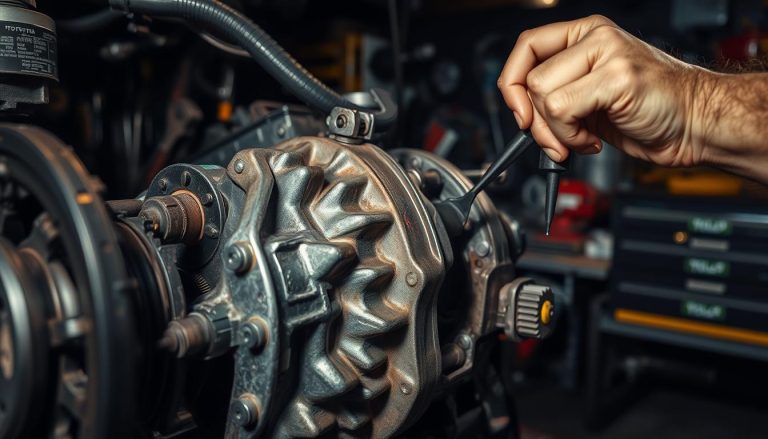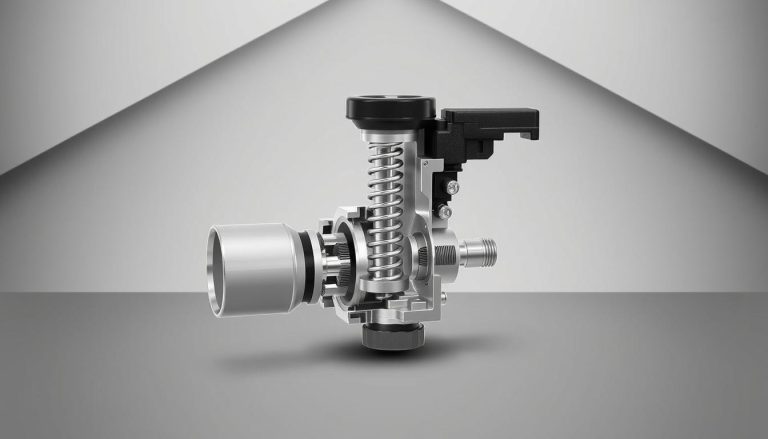Toyota Ignition Problems: Diagnosis & Fixes
Toyota vehicles can have starting issues, causing frustration and anxiety. It’s important to fix these problems to ensure a smooth drive. This guide will help you find the causes of ignition issues and offer solutions.
Whether you want to fix the problem yourself or need professional help, we’ve got you covered. Our advice will save you time and improve your vehicle’s performance.
Common Symptoms of Starting Problems in Toyota
Spotting starting issues early in Toyotas can save a lot of time. It also helps avoid bigger problems later. Knowing the signs can help you fix the problem quickly.
Dashboard Lights Ignition
Dashboard lights are often the first sign of trouble. If they don’t light up when you try to start, it might be a battery or ignition problem.
No Sound
Turning the key and hearing nothing usually means a problem with the ignition switch or starter motor. This silence often points to a common ignition issue.
Clicking Noise
A clicking sound when starting might mean a starter solenoid issue. This usually happens when the electrical system can’t send enough power.
Slow Crank
A slow crank when starting could be a weak battery or a failing starter motor. Fixing these issues quickly can stop the starting system from failing completely.
Electrical Accessories Functioning
If lights and radio work but the engine won’t start, it’s likely a starter or ignition problem. This means it’s not the battery.
Spotting these signs early helps fix problems fast. This saves time and money on repairs.
Checking the Battery
A failing battery often causes starting problems in Toyota vehicles. Fixing these issues quickly can stop Toyota ignition system failures. It also reduces the need for expensive Toyota ignition repair services. Here are the basic steps to find and fix battery problems.
Visual Inspection
Start by looking at the battery. Look for corrosion, cracks, or leaks on the terminals. Corrosion can stop the battery from working right, leading to Toyota ignition system failures. Cleaning the terminals and making sure they’re connected well can fix small problems.
Voltage Test
Use a multimeter to test the voltage. A good battery should show around 12.6 volts or more when the engine is off. If it’s much lower, the battery might need to be replaced. Checking voltage regularly can help avoid Toyota ignition system failures.
Jump Start
If your car won’t start, a jump start can help. Use jumper cables to connect your battery to another car’s working battery. This can tell you if the problem is with the battery or something else. But, if you jump start your car often, it means there’s a bigger issue that needs a professional to fix.
Checking your battery regularly can help your car’s ignition system last longer. Being careful and proactive can prevent starting problems. This way, you can avoid expensive Toyota ignition repair services later on.
Inspecting the Starter Motor
The starter motor is key to your Toyota’s ignition system. Finding and fixing starter motor issues keeps your car running well. Here are important steps to check and find problems with the starter motor.
Listen for Sounds
A good starter motor makes a strong, steady sound when you turn the key. If you hear grinding, clicking, or nothing, it might be a sign of trouble. These sounds help you figure out and fix ignition problems.
Check Connections
It’s important to make sure all connections to the starter motor are tight. Loose or rusty connections can stop it from working right. Checking these connections often and getting quick repair services keeps your car starting up.
Testing the Starter
Testing the starter motor’s voltage at the terminals shows if it’s getting enough power. A voltage drop test can show where the system is not working well. Finding these issues helps fix ignition problems and keeps your car running smoothly.
Investigating the Ignition System
When your Toyota key won’t turn, it’s time to check the ignition system. Look at the ignition switch, warning lights, and the ignition coil. Each part plays a key role in starting your car.
Ignition Switch Check
Start by checking the ignition switch. Try turning the key slightly to see if it works. A bad switch can stop the car from starting.
Look for Warning Lights
Dashboard lights can tell you a lot. If your key won’t turn, watch the lights when you try to start. Certain lights can point to problems with the ignition or battery.
Ignition Coil Inspection
Don’t forget to check the ignition coil. It’s important for sparking the fuel. A damaged coil can cause misfires or stop the engine from starting.
Checking Fuses and Relays
Checking your Toyota’s ignition system often means looking at the fuses and relays. These parts are key for the electrical flow to start the engine. Fixing common Toyota ignition issues can start with checking these elements for damage or disconnections.
Looking closely at fuses and relays can help find the main problem with Toyota ignition system failures. If a fuse is blown or a relay is bad, just replacing them can fix it. This careful check makes sure you don’t miss simple fixes.
Here’s a quick look at how different fuses and relays affect the ignition:
| Component | Function | Common Issues | Recommended Actions |
|---|---|---|---|
| Fuse | Protects electrical circuits from overcurrent | Blown fuse | Replace with the correct amperage fuse |
| Relay | Switches electrical power to the starter motor | Faulty or stuck relay | Test and replace if non-functional |
Not checking these parts can lead to bigger and more expensive problems. Keeping fuses and relays in good shape makes your car run better. It also saves you time and money in the long run.
Troubleshooting Fuel System Issues
When your Toyota won’t start, checking the fuel system is key. Make sure there’s enough fuel, check the fuel pump, and look for clogs in the fuel filter. These steps help fix ignition problems and ensure the engine gets the fuel it needs.
Fuel Tank Level
Start by checking the fuel tank level. It might seem simple, but an empty tank is often overlooked. Always check the fuel level before looking for other problems.
Fuel Pump Operation
Then, check if the fuel pump is working. A bad fuel pump stops fuel from reaching the engine, making it hard to start. Turn the key to “on” and listen for a humming sound from the tank. This sound means the pump is working.
Fuel Filter
The fuel filter is also important. A clogged filter can block fuel flow, causing starting issues. Check the filter and replace it if it’s dirty or clogged. This ensures clean fuel gets to the engine.
Regular checks and timely Toyota ignition repair services can help maintain your vehicle’s performance and prevent unexpected breakdowns.
Addressing a Faulty Alternator
A bad alternator can really hurt your car’s performance, causing many ignition problems. A drained battery is a common sign of a faulty alternator. This can make your Toyota hard to start. Getting your car checked by a professional can help fix these issues fast.
First, check the battery to see if it’s the problem. After starting, if your headlights get dim, it might mean the alternator isn’t working right. Looking into these signs and figuring out if the alternator is the issue is key.
If the alternator is the problem, fixing or replacing it can solve many ignition issues. This helps the battery keep a charge and makes sure other car systems work well.
For better car care, get regular check-ups to catch alternator problems early. This keeps your car running smoothly and reliably.
Dealing with Faulty Spark Plugs
Spark plugs are key to your Toyota’s engine. Faulty spark plugs can hurt engine performance and stop your car from starting. They ignite the air-fuel mix in the engine’s cylinders, needed for combustion.
https://www.youtube.com/watch?v=9vyPZLAyJD4
- Engine misfires or rough idling
- Difficulty starting the engine
- Decreased fuel efficiency
- Check engine light illumination
Regular maintenance and spark plug checks are essential. Replace spark plugs every 30,000 to 50,000 miles. Modern iridium or platinum plugs may last longer but need checks too.
Here’s how to fix Toyota ignition problems with spark plugs:
- Remove the old spark plug: Use a spark plug socket to carefully remove the faulty plug.
- Inspect the removed plug: Check for wear, carbon build-up, or damage.
- Install the new spark plug: Screw in the new plug by hand, then tighten with the socket.
- Reconnect the ignition coil: Make sure the ignition coil is securely attached to avoid more problems.
To keep your engine running well, include spark plug checks in your maintenance routine. This will prevent bigger, more expensive problems.
Key Components of Toyota Ignition Systems
Knowing the parts of Toyota ignition systems is key to fixing problems. The ignition switch, coil, and key all have important roles. They help your car start right. Spotting issues early can lead to quick fixes and better car health.
Ignition Switch
The ignition switch connects the driver to the engine. It tells the starter motor to start the engine. Trouble with it can make starting the car hard or impossible. Keeping it in good shape helps avoid these problems.
Ignition Coil
The ignition coil boosts the battery’s voltage for the spark plugs. If it fails, you might see misfires or stalling. Regular checks and repairs can keep it working well.
Ignition Key
The ignition key works with the switch to start the car. Worn or damaged keys can cause starting issues. Replacing them keeps your car running smoothly.
| Component | Function | Common Issues | Maintenance Tips |
|---|---|---|---|
| Ignition Switch | Initiates the engine cycle | Sticking, failure to turn, no response | Regular checks, professional servicing |
| Ignition Coil | Amplifies voltage for spark plugs | Misfires, stalling | Routine inspections, timely replacements |
| Ignition Key | Starts the ignition switch | Damage, wear and tear | Replace worn keys, keep in good condition |
Handling Security System or Anti-Theft Issues
Modern Toyotas have advanced security systems to keep them safe. But, these systems can sometimes cause ignition problems. If your Toyota key won’t turn, it might be because of a security system issue. Troubleshooting often means fixing these malfunctions.
First, check if your key fob is working right. Weak or dead batteries can stop the system from recognizing your key. This can prevent the ignition from turning. Try replacing the battery in your key fob to see if it helps.
Resetting the security system is another step. Sometimes, the system might think there’s a theft when there isn’t. Look in your vehicle’s manual for how to reset it. The steps might change based on your model and year.
If these steps don’t work, you might need professional tools. These tools can find the exact problem in the security system. At this point, it’s best to get help from a mechanic or Toyota dealership for safe and accurate repairs.
Knowing how to troubleshoot these issues can help you fix problems faster. But, always get professional help for complex problems to avoid more issues.
- Verify key fob batteries and replace if necessary.
- Reset the vehicle’s security system as per the manual.
- Consult professional diagnostic tools for deeper issues.
By following these steps, you can handle situations where your Toyota key won’t turn. This ensures safe and effective troubleshooting of ignition problems.
The Role of Split Wafers in Starting Problems
Split wafers play a key role in the ignition system of Toyota vehicles. They help in starting the car effectively. Knowing how they work can help fix ignition system failures.
Understanding Split Wafers
Split wafers are thin metal parts in the ignition barrel. They match the keys’ cuts, allowing the ignition switch to turn properly. But, they can wear out over time, causing starting issues.
Common Issues with Wafers
Wafers can wear out, bend, or break. This damage can lead to ignition jams, making it hard to start the car. Spotting these problems early is important to fix ignition system failures.
Professional Repair Solutions
When split wafers go wrong, you need a pro to fix it. Skilled technicians can replace worn-out wafers or repair the ignition barrel. This ensures your car starts smoothly again.
When to Seek Professional Help
At times, fixing Toyota ignition problems is more than a DIY task. Knowing when to ask for help is key for your car’s health and your peace of mind. If you face complex ignition issues that won’t go away, it’s time to call the experts.
Look for Toyota ignition repair services if you see strange dashboard lights or if your car won’t start. Ignition troubles can hide deeper problems that only pros can find and fix. Getting help from skilled technicians ensures your car stays reliable and runs well.
If you don’t have the right tools or know-how for repairs, getting professional help saves time and prevents damage. Trusted service centers have the latest tools to fix ignition problems quickly and right. It’s smart to know when to ask for help to protect your car and your investment.
Toyota Ignition Problems: DIY vs. Professional Repair
Fixing Toyota ignition problems can be a tough choice for car owners. They must decide if they should do it themselves or get a professional. Understanding the pros and cons of each option is key to making the right choice.
When to DIY
If you know a bit about car mechanics, you might try fixing some ignition problems yourself. Simple tasks like checking the ignition coil or spark plugs are doable for DIY fans. But, make sure you have the right tools and know-how.
Benefits of Professional Repair
Choosing professional repair has many benefits, mainly for tricky and ongoing issues. Certified mechanics have the right tools and know-how to fix complex problems. They make sure all issues are found and fixed, reducing the chance of problems coming back.
- Access to advanced diagnostic equipment
- Expertise in handling complex ignition problems
- Assurance of quality and reliability
- Time-saving convenience
When deciding between DIY and professional repair, think about the problem’s severity and your skills. Also, consider how important it is to have a reliable fix.
The Importance of Regular Maintenance
Regular maintenance is key to avoiding big problems with your car’s ignition system. By doing routine checks, you can spot issues early. This keeps your car running smoothly and efficiently.
Regular inspections and repairs help prevent sudden ignition problems. They also make your car last longer. This is a smart move for keeping your car in top shape.
Working with professional Toyota repair services is a good idea. They make sure everything is working right. Certified techs can find and fix problems quickly, saving you money and stress.
Regular care also keeps your car’s value up. It’s a smart choice for the future. It makes your car more valuable when you decide to sell it.
Conclusion
Understanding and fixing Toyota ignition problems is key to your car’s reliable performance. This guide helps you diagnose and possibly fix issues yourself. Whether it’s a Toyota key won’t turn problem or other symptoms, we’ve got you covered.
Regular maintenance and attention to detail are vital in avoiding ignition problems. By following the diagnostics and fixes in this guide, you can handle issues like a Toyota key won’t turn. This helps you know when to call a professional mechanic.
In short, learning about your Toyota’s ignition system is worth it. It makes your car last longer and run better. Regular checks and maintenance keep your car safe and in top shape. Use this guide to fix ignition problems and enjoy stress-free driving.
FAQ
What are the common symptoms of Toyota starting problems?
Signs include dashboard lights, no sound when turning the key, and a clicking noise. You might also see a slow crank or see electrical accessories work even if the car won’t start.
How can I check my Toyota’s battery?
Look for corrosion on the battery. Use a multimeter to check voltage. Try a jump start to see if the battery works.
How do I inspect the starter motor in my Toyota?
Listen for odd sounds when you turn the key. Make sure all connections are tight. Test the voltage at the starter motor to find out if it’s the problem.
What steps can I take to troubleshoot Toyota’s ignition system?
Check the ignition switch with small key turns. Watch for warning lights for electrical signals. Look for damage on the ignition coil.
How can I check the fuses and relays on my Toyota?
Look for any damage or disconnections on fuses and relays. Replace any that are faulty to fix starting problems.
What should I do if I suspect fuel system issues in my Toyota?
Make sure there’s enough fuel. Check if the fuel pump works. Look for clogs in the fuel filter.
How can I address a faulty alternator in my Toyota?
Check the battery after starting. See if lights dim too much. Replacing or fixing the alternator can solve these problems.
What is the impact of faulty spark plugs on my Toyota’s starting problems?
Bad spark plugs can stop the engine from starting. They affect combustion. It’s important to check and replace spark plugs regularly.
What are the key components to check in Toyota’s ignition systems?
Key parts include the ignition switch, ignition coil, and ignition key. Each is important for starting the vehicle.
How do security system malfunctions affect my Toyota’s ignition?
Modern Toyotas have complex security systems. These can fail and stop the ignition. Troubleshooting might need professional tools.
What are split wafers, and how do they cause starting problems in Toyota vehicles?
Split wafers in the ignition barrel can wear out. This causes starting issues. Professional repair is needed to fix these problems safely.
When should I seek professional help for my Toyota ignition problems?
Get professional help for complex issues, strange signs, or when troubleshooting doesn’t work.
What’s the difference between DIY repairs and professional repairs for Toyota ignition problems?
DIY fixes work for simple problems. Pros offer detailed solutions for complex systems. They ensure all problems are fixed.
Why is regular maintenance important for preventing Toyota ignition problems?
Regular checks find issues early. This prevents unexpected breakdowns and keeps your car running longer.


